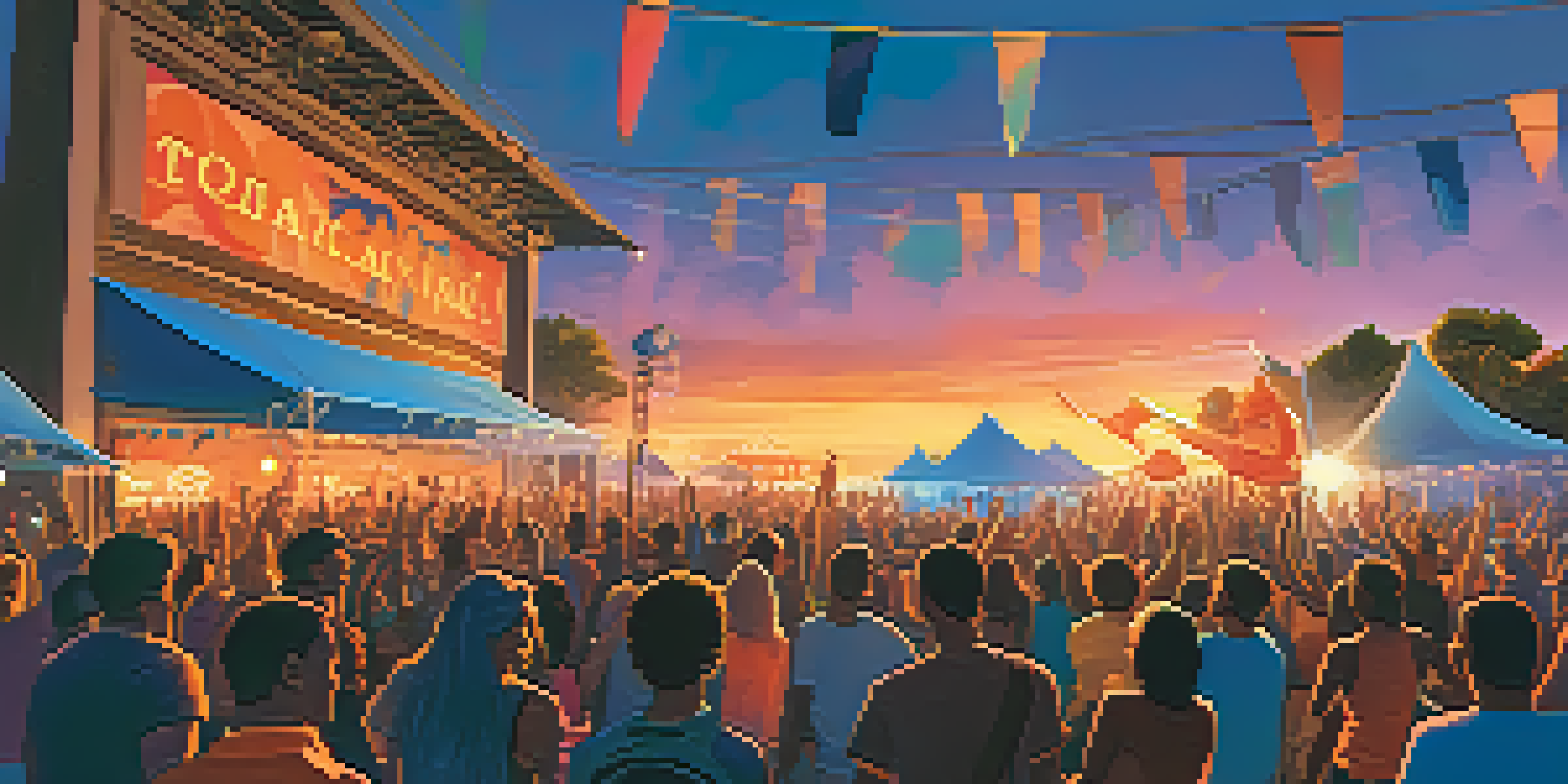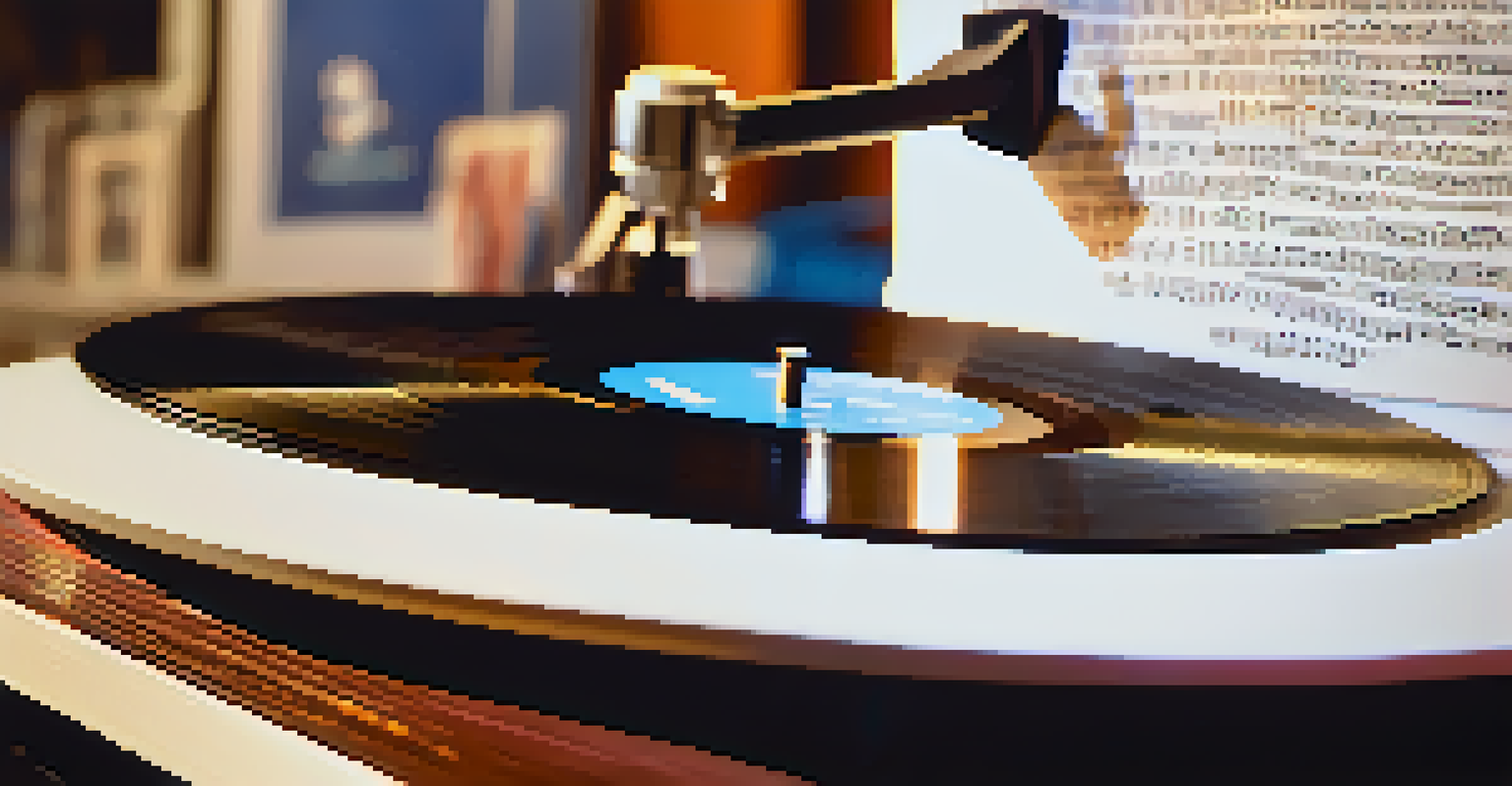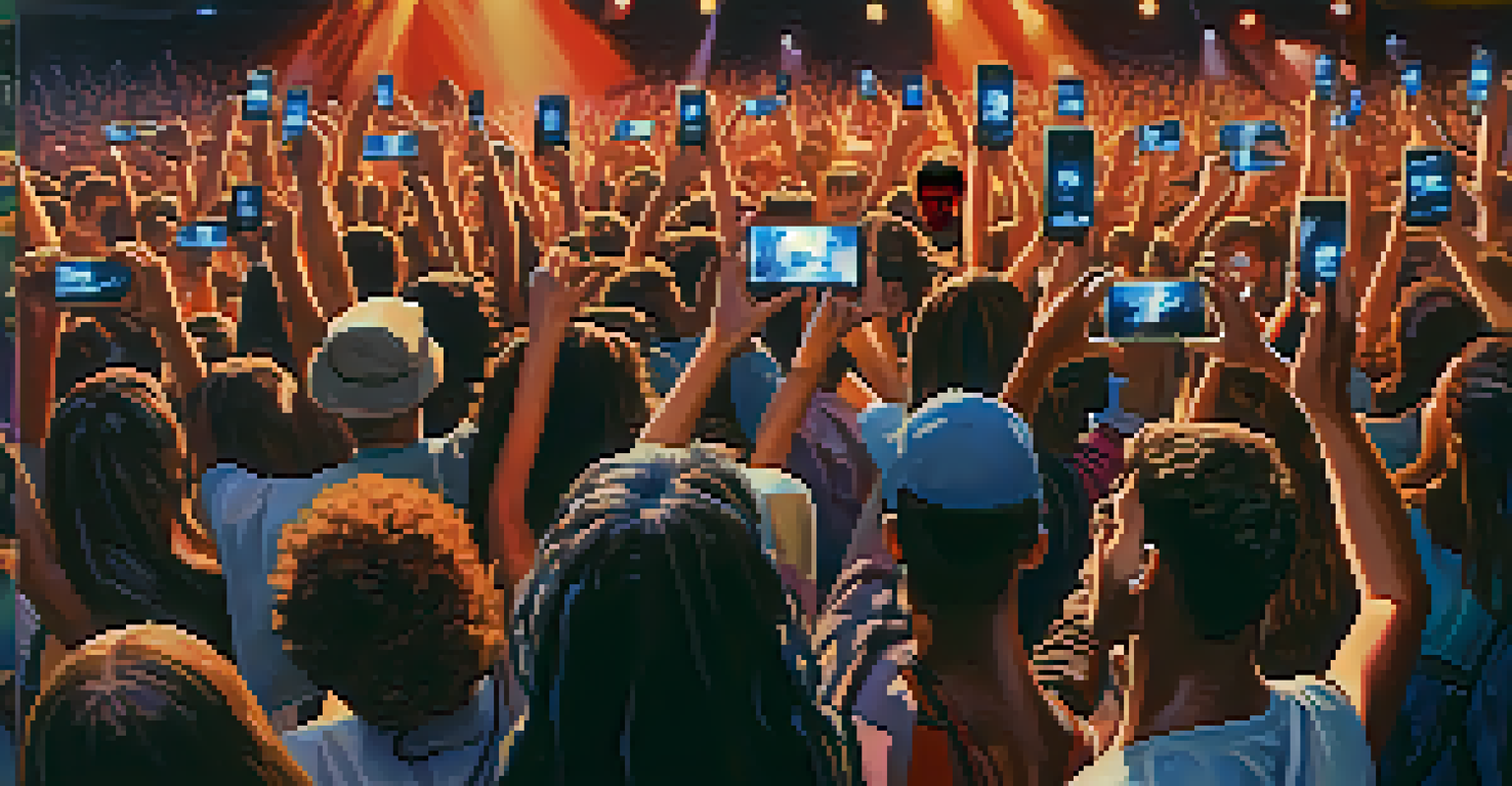The Relationship Between Music and Youth Political Engagement

The Power of Music as a Political Tool
Music has always been a powerful form of expression, often reflecting societal issues and political sentiments. From the protest songs of the 1960s to modern anthems, music can rally people around a cause, making it a compelling tool for political engagement. Young people, in particular, resonate with music that echoes their experiences and frustrations, often sparking their interest in activism.
Music can change the world because it can change people.
For instance, artists like Billie Eilish and Kendrick Lamar address themes of social justice in their lyrics, inspiring youth to engage in political discourse. When young listeners connect emotionally with a song, it can motivate them to take action, whether through participation in protests or simply by raising awareness on social media. This reflects how music can bridge the gap between personal feelings and collective action.
Moreover, music festivals and concerts often serve as platforms for political expression, where young attendees are encouraged to think critically about their role in society. The infectious energy of a live performance can transform a passive listener into an active participant, showcasing the unique ability of music to mobilize youth around political issues.
Music Genres and Political Messages
Different music genres convey political messages in varying ways, appealing to diverse youth audiences. Genres like hip-hop often focus on themes of systemic injustice and inequality, while punk rock may emphasize anti-establishment views. Understanding these nuances helps to recognize how different styles of music can impact political perspectives among young listeners.

Take the punk rock movement of the late 1970s, for example. Bands like The Clash and Sex Pistols used their music to voice rebellion against the status quo, influencing a generation to question authority. Similarly, contemporary hip-hop artists continue this tradition, using their platforms to speak out against social and racial injustices, prompting youth to engage politically.
Music Inspires Political Activism
Music serves as a powerful tool for political engagement, motivating young people to connect emotionally and take action on social issues.
It’s fascinating to see how these genres not only entertain but also educate. By addressing real-world issues through catchy tunes and relatable lyrics, artists can engage young listeners in discussions about politics, thereby expanding their understanding and encouraging them to take a stand.
Social Media: Amplifying Music's Political Impact
In today's digital age, social media serves as a powerful amplifier for music's political messages. Platforms like TikTok and Instagram allow songs with strong political themes to go viral, reaching millions of young listeners in a matter of hours. This rapid dissemination of music fosters a culture of political awareness and engagement among youth, making them more likely to participate in activism.
The power of music makes all the difference. It can speak to you when words fail.
For instance, songs that trend on social media often come with hashtags that promote social movements, encouraging listeners to share their thoughts and experiences. When a song resonates with a particular cause, it can inspire a wave of activism, as seen with tracks like 'This Is America' by Childish Gambino, which sparked conversations about race and gun violence.
This synergy between music and social media not only increases visibility for important issues but also creates a sense of community among young people. As they share and discuss their favorite politically charged songs, they cultivate a shared identity and commitment to activism, further driving their engagement.
Case Studies: Successful Music-Driven Movements
Looking at historical examples, we can see how music has successfully driven political movements. The 'We Are the World' project in the 1980s united artists to raise funds for famine relief in Africa, demonstrating music's ability to mobilize collective action for a humanitarian cause. Such initiatives not only raised money but also heightened awareness about pressing global issues among youth.
More recently, the 'March for Our Lives' movement, led by students following the Parkland shooting, utilized music to amplify their message. The event featured performances from artists like Ariana Grande and Common, drawing attention to gun reform and engaging a younger audience. This illustrates how music can be a rallying point for activism, creating a powerful intersection between art and advocacy.
Genres Shape Political Perspectives
Different music genres convey distinct political messages, influencing youth audiences and their understanding of societal issues.
These examples highlight that when music is combined with a clear political message, it can lead to tangible change. By understanding and learning from these movements, young people can harness the power of music to advocate for the issues they care about.
The Role of Music Education in Political Awareness
Music education plays a crucial role in shaping young people's understanding of political issues. By incorporating discussions about social justice and activism into music curricula, educators can empower students to think critically about the world around them. This not only fosters a love for music but also cultivates a sense of responsibility and engagement in civic matters.
For example, programs that involve songwriting and composition can provide students with tools to express their views on political issues. When students create music that reflects their perspectives, they become more invested in the messages they convey, leading to a deeper understanding of the importance of political engagement. This hands-on approach makes learning about politics both relatable and impactful.
Moreover, music education can facilitate discussions about historical movements and the artists who influenced them. By examining the connections between music and social change, students can see firsthand how they, too, can contribute to shaping the future through their creative expressions.
Challenges and Critiques of Music and Political Engagement
While music can indeed inspire political engagement, there are challenges and critiques worth noting. One major concern is the commercialization of political messages in music; sometimes, artists may prioritize profit over genuine activism. This can dilute the impact of their messages, leading to skepticism among listeners about the authenticity of the artist's intentions.
Additionally, not all music that claims to be politically charged resonates with the youth. Some may argue that certain artists exploit political themes for publicity rather than fostering real change. This raises questions about the responsibility of artists to be mindful of their influence and the messages they promote.
Social Media Amplifies Music's Impact
Social media platforms enhance the reach of politically charged music, fostering a culture of awareness and community among young activists.
Understanding these challenges is essential for young listeners. By critically analyzing the music they consume, youth can discern which messages align with their values and foster genuine political engagement, rather than just passively accepting what they hear.
Looking Ahead: The Future of Music and Political Engagement
As we look to the future, the relationship between music and political engagement is likely to evolve further. With the rise of new platforms and technologies, artists will continue to find innovative ways to connect with young audiences and inspire activism. The blending of music with other forms of media, such as podcasts and video content, will create new avenues for political expression.
Moreover, as global issues become increasingly interconnected, music will play a pivotal role in uniting youth around common causes. Collaborations between artists from different backgrounds and cultures can lead to a richer dialogue about social justice, environmental sustainability, and human rights, fostering a more inclusive movement.

Ultimately, the future of music and political engagement will depend on the creativity and passion of the next generation. By harnessing the power of music as a catalyst for change, young people can shape a more just and equitable world, proving that the rhythm of activism can resonate through the ages.